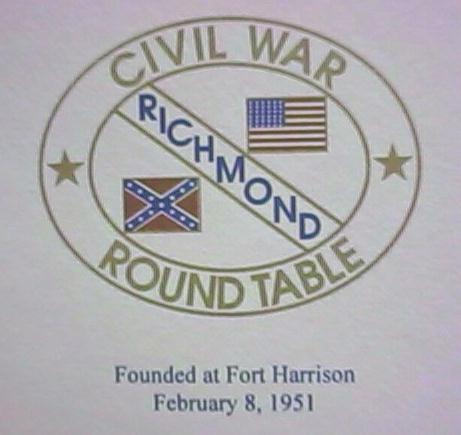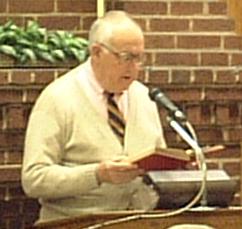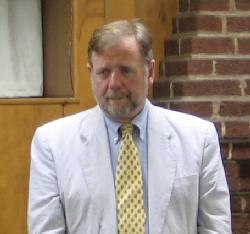


July 2005
rcwrt.org
Richard Forrester, President Rob Monroe, Editor 8008 Spottswood Road 2416 Edenbrook Dr. Richmond, VA 23229 Richmond, VA 23228-3040 dforrester@verizon.net RMonroe500@comcast.net
July 2005 PROGRAM Dr. Richard M. McMurry "A New Framework for Civil War Military History" 8:00 p.m., Tuesday, July 12, 2005, at the Boulevard United Methodist Church, 321 N. Boulevard, Richmond, VA (corner of Boulevard and Stuart Ave.) Enter the basement door on the right side under the front steps. An Atlanta native, Richard McMurry received a B.S. degree in history from VMI and an M.A. and a Ph.D. from Emory University. From 1967 to 1981 he taught history at Valdosta State College in Georgia and taught as an adjunct professor at North Carolina State University from 1981 to 1988. Since 1988 he has been a freelance writer and speaker and has served as a guide/historian for many tour and cruise groups. McMurry has authored more than 100 articles on various facets of the Civil War. He has edited or co-edited several works, and is the author of numerous award-winning books including Virginia Military Institute Alumni in the Civil War: In Bello Praesidium. His latest book is The Fourth Battle of Winchester: Toward a New Civil War Paradigm. McMurry now makes his home in Roanoke. For almost a century and a half, most people have held a very limited view of Civil War military history. They have looked at the subject only in a context that focuses on the battles fought in one small area of the war. This extremely limited view, McMurry asserts, imprisons people in a narrow, provincial framework that produces a misleading understanding of the conflict. This poor understanding in turn gives an erroneous interpretation not only of how the war was fought but also of several larger questions relating to the nation's military history in general and to the Civil War in particular. What is the best framework for understanding Civil War military history? McMurry will explore this question at the RCWRT's July meeting.
Summary of June Meeting
 |
 |
Subcommittee to Meet July 22 The Clerk's Office of the House of Delegates has announced that the first meeting of the Virginia General Assembly Joint Subcommittee to Examine the Cost and Feasibility of Relocating the Museum and White House of the Confederacy will be held at 10am on Friday, July 22. The majority of the meeting will take place in Richmond in House Room C of the General Assembly Building (the SE corner of Broad and 9th streets, across the grounds from the State Capitol). While the agenda has not been set, it is expected that the subcommittee will elect a chairman, and the museum's executive director, Waite Rawls, will give a detailed presentation on the situation. It has been suggested that subcommittee members will then walk several blocks north to the museum for a formal tour, but that has not yet been determined. This meeting and the three or four meetings that follow are open to the public. Until a chairman has been elected, citizens may voice their opinions to the bill's patron, William Janis (R-House District 56). His contact information is: P.O. Box 3703, Glen Allen, VA 23058; (804) 726-5856, or e-mail: Del_Janis@house.state.va.us. Any questions about the agenda for this meeting should be addressed to Robie Ingram or Bryan Stogdale in the Division of Legislative Services, (804) 786-3591.
Civil War Buffs Mourn the Loss of Two Noted Historians Last month the Civil War community was saddened to learn of the deaths of two of its most recognized and respected historians. On June 15, Brian C. Pohanka, 50, died of cancer at his home in Alexandria. On June 27, Shelby Foote died in Memphis at the age of 88. Born in Washington, Mr. Pohanka became enthralled with the Civil War at a young age. He was a voracious reader and favored American Heritage history books and Bruce Catton's works. Mr. Pohanka went on to earn a history degree from Dickinson College in Pennsylvania. He worked as a senior researcher for the Civil War series of books published by Time-Life. He was a consultant for the History Channel's "Civil War Journal" series and worked as an advisor and military coordinator for major motion pictures such as "Glory" (1989) and "Cold Mountain" (2003). Mr. Pohanka was instrumental in forming the Association for the Preservation of Civil War Sites, now known as the Civil War Preservation Trust. CWPT President James Lighthizer credited Mr. Pohanka for helping to "start the battlefield preservation movement that we know today." A native of Greenville, Mississippi, Mr. Foote attended the University of North Carolina for two years, served during World War II, and worked as a journalist in his younger years. He moved to Memphis in 1953 and lived there the remainder of his life. He worked 20 years to complete The Civil War: A Narrative (1974), a three-volume epic that brought him acclaim. But it was Ken Burns' 1990 "The Civil War" documentary on PBS that immortalized Mr. Foote to thousands of viewers. Mr. Foote's commentary and distinctive Southern drawl were prominently featured in the film and he instantly became a somewhat reluctant celebrity.
Fall Field Trip Announced The Richmond Civil War Round Table fall tour will be held on Saturday, October 1, 2005. Our guide will be John V. Quarstein, Director of the Virginia War Museum and author of "The Battle of the Ironclads". He is an expert on the Civil War on the Virginia Peninsula and a dynamic tour guide. We will begin our tour at Lee Hall and visit several land sites in the morning. After lunch at Fort Monroe, we will board the Miss Hampton II and explore the scene of the historic clash between the CSS Virginia and the USS Monitor. The bus departs at 8am from the James River Bus Terminal at 915 North Allen Avenue (located between Broad and Leigh streets) and will return by 5pm. The cost is $35 per person. Guests are welcome. Please bring your own lunch and drink. Note that security measures at Fort Monroe require that all visitors present a photo ID. If you have questions, please contact Bernie Fisher at (804) 730-1785 or via email, bernard.fisher@comcast.net. Please make checks payable to RCWRT and send along with the form below to: Bernie Fisher 7300 Ann Cabell Lane Mechanicsville, VA 23111 2005 RCWRT Fall Field Trip Date: ______________ Name: _________________________________________________ Address: ____________________________________________________________________ Phone Number: (_____) ______-________ Number of reserved seats: _____ x $35 = $ _______ total (Make check payable to RCWRT)
RCWRT Monthly Speakers for 2005
You can receive your newsletter sooner and help the Richmond Civil War Round Table save money by signing up to receive your newsletter via email. To add your name to the list, simply email the editor at RMonroe500@comcast.net Thanks!
To facilitate the printing and timely distribution of the monthly newsletter, information for it should be submitted to the editor no later than the following dates: August newsletter, July 30 September newsletter, September 3 October newsletter, October 1 November newsletter, October 29 December newsletter, December 3 Information may be emailed to RMonroe500@comcast.net or Richmond Civil War Round Table Newsletter Rob Monroe, Editor 2416 Edenbrook Dr. Richmond, VA 23228-3040
Return to News Letters Index
Return to main page

©R.C.W.R.T. 2005